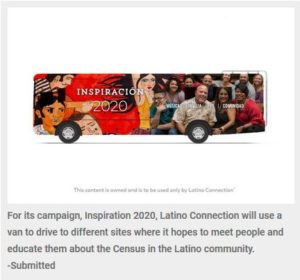
Biz, Latino leaders push for accurate 2020 Census By: Brian Pedersen(link sends e-mail)
November 18, 2019

With millions of dollars in federal funding depending on the accuracy of the 2020 biennial census, business and Latino community leaders in the Greater Lehigh Valley are working to ensure every resident is counted.
“In Pennsylvania, we receive $39 billion each year from census-derived data to support federal programs,” said Megan Briggs, director of community investments at Lehigh Valley Community Foundation.
LVCF is taking a leadership role in the census, investing staff-time, resources, and funding to ensure every person is counted in 2020.
“An undercount of the estimated 670,000 Lehigh Valley residents puts federal funding at risk, while also decreasing the amount of representation our community has in government,” Briggs said.
The census, which is conducted every 10 years, is required by the Constitution. In addition to being used to allocate seats in Congress, it’s also used to determine where billions of dollars in federal tax dollars are spent.
Census data is used by businesses to determine markets and weigh new locations. It’s also used to allocate money to fix ailing infrastructure, such as roads and bridges; education programs, including worker training critical to attracting and retaining companies.
For those reasons and more several organizations are stepping up to get a complete and accurate count on Census Day on April 1, particularly among the immigrant populations who are often reluctant to respond.
LVCF, an Allentown nonprofit, committed $65,000. LVCF is collaborating with nonprofit organizations to get an accurate count in Census track areas in Allentown’s Center City, Bethlehem’s South Side and Easton’s West Ward. These areas were undercounted by more than 30 percent in 2010, resulting in a 10-year loss of federal funding.
Four nonprofit organizations are receiving $10,000 grants to implement a variety of tactics to address these areas and beyond as part of LVCF’s Civic Engagement: Census 2020 Initiative. These organizations are Promise Neighborhoods of Allentown, Hispanic Center of the Lehigh Valley of Bethlehem, Project of Easton, and Make the Road Pennsylvania of Allentown.
LVFC also has a Census Equity Fund to support several initiatives, including: providing organizations with technical assistance and training, building awareness through events for nonprofits, and collaborating with the region’s nonprofit, business and government stakeholders.
“An undercount will increase the demands placed on the area’s nonprofits and the philanthropic community to try to fill the gap of decreased federal funds and services,” said Bernie Story, LVCF president and CEO. “Instead of needing to make up that gap, we are proactively funding efforts and investing resources to ensure a complete and accurate count.”
In Berks County, efforts are underway to focus on getting an accurate count in target areas that include Reading and part of Maxatawny Township outside Kutztown University.
In Reading, some of these areas include parts of the downtown known to have transient populations and many immigrants, said Isabel Monterrosa, publicity coordinator for the Berks Complete Count Committee at the Center for Excellence in Local Government at Albright College in Reading.
The other area with an undercounted population in 2010 was Maxatawny Township, which stemmed from off-campus housing at Kutztown University.
“We expect that might be a problem at Alvernia University because they expanded into more off-campus housing,” Monterrosa said.
Undercounts occur when students sublet their properties to other students who are not on the lease, she added.
Counting immigrants

Undercounts can occur with immigrant populations fearful of having their status questioned even though the federal government removed a citizenship question it intended to include on Census 2020.
Part of the outreach effort involves educating people so they know the question is no longer there and that Census takers take oaths to protect the privacy of the individuals from whom they obtain data, Monterrosa said.
With more people counted, more funding is available for a wide range of programs.
“The Census data is the information that is used to develop and deliver programs all over the place,” Monterrosa said.
Communities use the money for grants for business expansion and economic development, and businesses rely on the data to project growth and help with hiring, said Monterrosa, who acts as a liaison to the Census bureau.
“The goal is to bring awareness of why it’s so important to our community,” she said. “All of the social programs will receive federal funding. They are going to benefit from these services.”
While the business community is becoming more aware of the importance of the Census, many in the general public don’t know that completing the survey is a civic duty, like voting and serving on a jury.
The 2020 Census is also the first that allows residents to respond online. This, too, Monterrosa said, will present challenges in terms of ensuring people who do not have Internet access can complete it. Access to the web is being provided via a mobile lab through the local libraries, said Dave Myers, an adviser with Berks Alliance, a nonprofit. Those labs can be sent to neighborhoods that lack internet access.
In Berks County, officials estimate that 4 to 5 percent of the county’s population, between 16,000 and 17,000 people, were missed in 2010, Myers said. “Because of that, there was a lot of funding that was missed.”
Collecting data
The Census counts everyone, including people who are homeless, in correctional facilities and nursing homes, he added.
The Berks Complete Count Committee raised $160,000 to create the outreach effort, he said.
“We have to make sure everyone is counted,” Myers said. “It’s important, obviously for funding and political reasons, but also for the data used.”
Census data affects housing affordability, business location decisions and other economic factors.
“It could mean an analysis that precludes a retailer from looking at our community,” Myers said.
From transportation funding that fixes and repairs roads and bridges to calculations of available labor force, the funding has a wide business impact.
In Central Pennsylvania, one organization is preparing to launch an initiative at the end of the year geared toward educating people, particularly the Latino community, about the importance of getting an accurate count for Census 2020.
George Fernandez, owner of Latino Connection, a marketing and communications agency in Penbrook, Dauphin County, said his organization is starting a grassroots campaign called Inspiration 2020, designed to educate people throughout the state wherever they work, live and play. The organization will use a van to drive to different sites where it hopes to meet people and educate them about the Census in the Latino community.
“We are looking for partners that want to welcome us on their job site,” Fernandez said.
With the upcoming federal election and Census 2020, Fernandez believes it’s a critical time for Latinos.
For its campaign, the organization is promoting what it describes as four pillars: music, family, faith, and community. On 60 TV screens throughout corner stores and bodegas around the state, the organization will talk about the Census and why it’s so important, he added.
“A lot of the decisions businesses make today are based on data from the census,” Fernandez said, but acknowledged there is fear of it in the Latino community.
Focus on Latinos
The Latino population is growing, which makes education around the Census that much more critical, Fernandez said, noting that Reading elected its first Latino mayor, Eddie Moran, and county commissioner, Michael Rivera.
“Latinos are front and center of the Presidential election,” Fernandez said. “I think the efforts around education are vital to the success of Pennsylvania. Pure education is going to be vital to our success.”
David Black, president and CEO of the Harrisburg Regional Chamber and Capital Region Economic Development Corp., say they are poised to start the education campaign early next year.
“We’ll be doing a push at about the time the census information starts dropping in people’s mailboxes and people start canvassing,” he said.
The Harrisburg business community has not shown much concern or awareness about Census 2020, according to Black.
“We want to make sure we are counted and they try to get things as correct as possible, not just for our region, which is a growing region in Pennsylvania like the Lehigh Valley, but Pennsylvania as a whole,” Black said.

